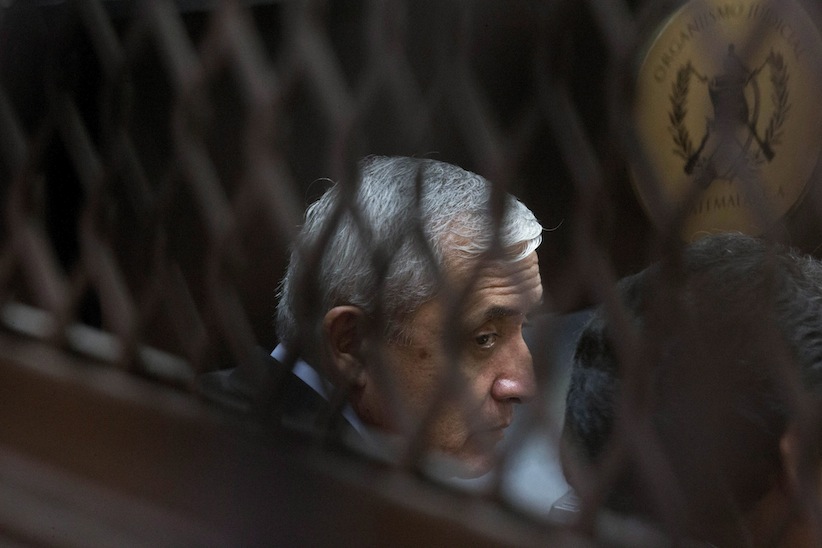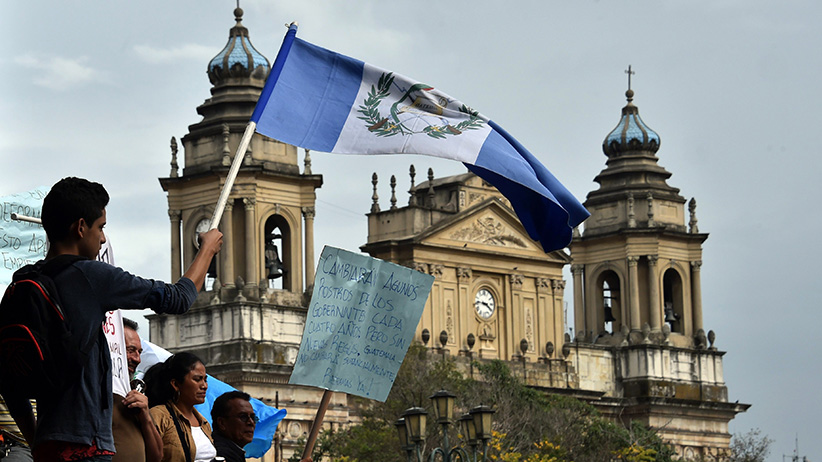Guatemala is in political crisis. So why are Mexicans envious?
Guatemala’s president was forced out of office; its top leaders were charged with corruption. But at least there’s a movement to tackle it. Not so in Mexico.
Guatemalans protest on the eve of general elections in Guatemala City on September 5, 2015. Guatemalans disgusted with rampant corruption that felled their president are set to vote Sunday in elections many see as meaningless without a vast political system cleanup. (RODRIGO ARANGUA/AFP/Getty Images)
Share

Ex-Guatemalan president Otto Pérez Molina, fresh from being forced out of office, sat stony-faced in court earlier in the month as prosecutors played wiretaps and presented the evidence against him for an alleged fraud known as La Línea, or “the Line.” The scheme allegedly involved the president, vice-president and senior officials accepting bribes in exchange for allowing imports to enter the country duty-free, or at reduced tariff rates.
Pérez Molina, looking every bit his 64 years, jotted down notes, professed his innocence and pointed out that the investigation against him was brought at his request and that he once turned down more than a million dollars in bribe money from cartel kingpin Joaquín “El Chapo” Guzmán—who was detained in Guatemala in the early 1990s. Pérez Molina was ordered held and later indicted.
Related: El Chapo is infamous—and part of a dying breed of cartel kings
Across the border in Mexico, President Enrique Peña Nieto, caught up in his own conflict-of-interest imbroglio, gave his state-of-the-nation address. It’s an annual act of self-aggrandizement, though, for a few moments this year, self-criticism—sort of. Peña Nieto spoke of the scandals—without getting specific—that sent his approval plunging: the kidnap and presumed killing of 43 students; allegations that he, his wife and his finance minister purchased properties from prominent contractors; and, perhaps most embarrassing, El Chapo tunnelling out of a maximum-security prison.
He made no apologies, then listed the usual string of accomplishments and ended with a warning of rising populism—an allusion to former Mexico City mayor Andrés Manuel López Obrador, who spooks the business and political classes, but leads early polls for the 2018 presidential election. Ironic, coming from a leader whose administration gave away millions of TVs to impoverished Mexicans in an election year.
Guatemala’s pursuit of corruption cases against its president and vice-president is unprecedented for Latin America, an area currently consumed with corruption scandals. For a country used to making news for all the wrong reasons (drought, drug trafficking, children fleeing violence, to name three), Guatemala is emerging as an example and object of envy for many in Central America. Even in Mexico, where Guatemala seldom attracts much attention and isn’t always viewed favourably, citizens and the chattering classes are calling for the country to follow its example. “I will never again call Guatemala a small country,” says Manuel Molano, adjunct-director of the Mexican Institute for Competitiveness think tank. “They’ve shown a political maturity that Mexico doesn’t have.”
Especially exemplary was the work of the International Commission Against Impunity in Guatemala (CICIG), an entity established by the United Nations and the Guatemalan government. It helped to expose scandals such as La Línea, in which investigators allege ex-vice-president Roxana Baldetti collected nearly $5 million. In a scam in the state social-security institute (IGSS), contracts were signed with a Mexican company to provide kidney care —only to have 13 patients die of substandard service. The IGSS president, a close confidant of Pérez Molina, and the central bank president, an IGSS board member, were subsequently arrested for fraud.

In a sign of the fatigue with politics as usual, TV comedian Jimmy Morales won the most votes in Guatemala’s Sept. 6 elections. His appeal seemed to be his lack of a political past. (Morales now moves to an Oct. 25 runoff election against Sandra Torres, a former first lady, who divorced president Álvaro Colom in 2011 in an attempt to bypass a ban on relatives running for president.) Morales ran for a party founded by ex-military men, promised little, but nonetheless emerged from a field of 14 candidates. “Jimmy represents the anger at the political class,” says María Wer, an economics student at Francisco Marroquín University—a hotbed of libertarian ideas. “It shows how bad the system is that you’d rather have a comedian than an actual politician.”
Guatemalans from all segments of society protested in the streets for 19 straight weeks over the spring and summer. Even students at Francisco Marroquín, which enrols the offspring of the economic elite, hit the streets with signs reading: “Los hijos de papi también nos importa”—or: “Rich kids care, too.”
Related: The rich kids of Mexico on Instagram
“Corruption is an issue that goes beyond ideology,” says Tommy Morales (no relation to Jimmy), an architecture student at the University of San Carlos of Guatemala. News of the protests made its way to Mexico, where Peña Nieto has had to confront the Casa Blanca (White House) scandal—so-named for the $7.2-million mansion his wife, former soap opera star Angélica Rivera, bought from a crony contractor. The Wall Street Journal later reported that the president and finance minister also bought homes from contractors, who went on to work for the federal government. Peña Nieto responded by appointing an avowed friend of his finance minister to the comptroller’s office and charged him with investigating the allegations. To no one’s surprise, the comptroller found no conflicts of interest, since none of the accused was a federal functionary at the time of the purchases. “This report was put together to exonerate, and it doesn’t stand up to the slightest analysis,” says Jesús Cantú, head of the school of government at the Monterrey Institute of Technology and Higher Education. “It’s an insult to Mexicans’ intelligence.”
Mexico recently approved the creation of an anti-corruption commission to better investigate and prosecute cases. Guatemala instead went with the CICIG, introduced in 2007 to tackle criminal groups and corruption in government. It floundered at first, but eventually put a corrupt political class on the run. It’s also gained approval—even though it’s headed by a foreigner—and has been proposed by protesters as a solution for corruption in other Central American countries.
Some in Mexico, including ex-foreign minster Jorge Castañeda, are calling for something similar. But observers see it as a no-go in a country with a history of placing restrictions on foreigners owning land near the beach and borders, and limiting many political and public positions to Mexican-born persons. Central American countries “are not especially xenophobic in their politics. They’re not nativists,” unlike Mexico, says Federico Estévez, political science professor at the Mexico Autonomous Institute of Technology and a Guatemalan citizen.
Related: In Mexico, where truth can be stranger than fiction, the satirists are king
Foreign scrutiny of the missing students’ case is already causing discomfort for some Mexicans, especially in the ruling Institutional Revolutionary Party, whose politicians insist the country can solve its own problems. In early September, a team of investigators from the Inter-American Commission on Human Rights found serious faults in the case and concluded that the students’ bodies were not burned in a landfill, as Mexican investigators insisted.
Estévez says combatting corruption is also more complicated in Mexico, where even things as simple as garbage collection, mail delivery and starting police investigations require extra-official payments—euphemistically called “tips” and “solidarity.”
“At the ordinary citizen’s level, Mexico is far more corrupt than Guatemala,” Estévez says. “It’s not just its politics that are corrupt; Guatemala’s [politics] are and always have been, but daily corruption, disguised corruption in the form of tips—these are things we are used to in Mexico.”
In Guatemala, meanwhile, ordinary people are promising vigilance and more protests to keep politicians honest, including their comedian-turned-possible president. “The next president, whoever it is,” Wer says, “knows he can’t step out of line.”